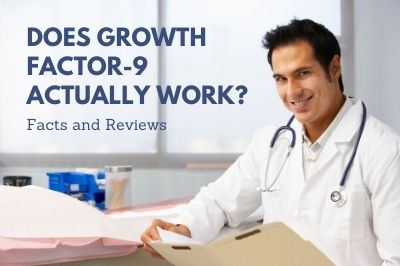If you follow the world of health supplements — specifically those purported to be beneficial for anti-aging and performance-enhancing purposes — you may have come across an emerging new product called growth factor-9 (GF-9).
Especially among bodybuilders looking to augment their muscle mass with increased lean muscle, GF-9 has emerged as a popular addition to their supplement regimens after workouts, often in addition to amino acid-rich protein shakes.
As we will explore more in-depth later on, GF-9 is essentially an amino acid formulation that was patented by an entrepreneurial firm and is now controversially marketed as an HGH booster. Novex Biotech, the marketers of GF-9, claim that it can boost circulating HGH levels by nearly 700% — an extraordinary claim with numerous implications that we’ll test later. From an evidence-based approach, does GF-9 work?
In this article, we’ll dive into the science behind GF-9, discuss whether it’s worth the investment, what real GF-9 users say about its effectiveness, and what role, if any, it might play in an HGH-boosting strategy.
How HGH Works in the Body
Before beginning an analysis of GF-9 and whether it actually achieves the results it is intended to, it’s important to consider the functions that HGH fulfills in the body. In individuals who have a diagnosed HGH deficiency, the anabolic hormone can:
- Stimulate lean muscle mass growth via protein-synthesis.
- Strengthen bones.
- Spur fat loss via improved metabolic health.
- Support a healthy cardiovascular system.
- Boost energy levels.
HGH is produced in the pituitary gland. After being released through pulsatile secretions, it travels throughout the body performing its anabolic (“building”) work.
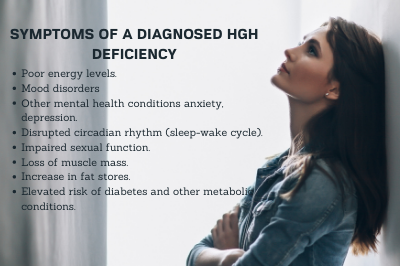 Without enough HGH, the body doesn’t benefit from the many activities of the hormone and overall health suffers. Some of the characteristic symptoms of a diagnosed HGH deficiency include:
Without enough HGH, the body doesn’t benefit from the many activities of the hormone and overall health suffers. Some of the characteristic symptoms of a diagnosed HGH deficiency include:
- Poor energy levels.
- Mood disorders and other mental health conditions such as anxiety and depression.
- Disrupted circadian rhythm (sleep-wake cycle).
- Impaired sexual function.
- Loss of muscle mass.
- Increase in fat stores.
- Elevated risk of diabetes and other metabolic conditions.
Patients who exhibit the signs of an HGH deficiency have several options to recover their good hormone health, many of which we will discuss later on. The central question at hand, though, is whether growth factor-9 represents one of those solutions to restore sub-optimal HGH levels.
What Is Growth Factor-9?
GF-9 is a supplement produced by a firm called Novex Biotech. The formulation is protected by various US patents. No other manufacturer is legally allowed to market or sell GF-9 products. GF-9 contains the following amino acids:
- l-lysine HCl
- l-arginine HCl
- oxo-proline
- N-acetyl-l-cysteine
- l-glutamine
The patented GF-9 formulation — while the ratios of the amino acids contained within are novel and proprietary — is not particularly revolutionary. Amino acids have been used for decades by athletes and others for their potential performance-enhancing benefits.
Do Amino Acid Supplements Like GF-9 Actually Increase HGH?
An honest assessment of the available clinical literature behind whether amino acids actually positively alter HGH levels over the long-term will show that the evidence is often contradictory or not entirely clear. One study on the effects of amino acids administered to elderly heart patients found that:
“Consumption of a mixture of amino acids failed to increase HGH concentration despite significantly greater elevations in plasma amino acid concentrations.”
There is some limited evidence of amino acids’ ability to trigger greater HGH release among athletes who take them. However, one study published in the medical journal Nutrition on the topic of these types of supplements in athletes noted that:
“The GH response to amino acid administration has a high degree of interindividual variability and may be altered by training status, sex, age, and diet.”
They go on to conclude that amino acid supplementation for the intended purpose of elevating HGH is not recommended in athletes, citing a lack of reliable evidence of their efficacy.
Does Growth Factor-9 Actually Boost HGH Levels?
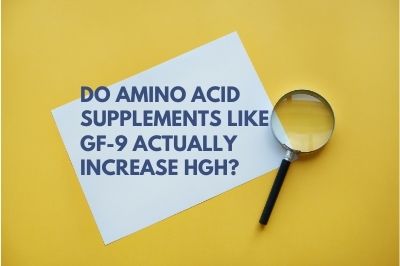 The evidence of GF-9’s long-term potential for elevating HGH levels is unclear at best. At the bottom of the Novex Biotech’s “Science” page, the company that sells GF-9 itself offers a critical disclaimer in the small print:
The evidence of GF-9’s long-term potential for elevating HGH levels is unclear at best. At the bottom of the Novex Biotech’s “Science” page, the company that sells GF-9 itself offers a critical disclaimer in the small print:
“Our results show that a single oral dose of these amino acids can significantly increase GH Levels after 120 minutes in healthy men and women*. Whether these GH changes persist over a longer duration or have other positive effects is being further examined.”
The bottom line on the effectiveness of GF-9 to achieve its intended purpose is that, while there is limited evidence of amino acids’ ability to elevate HGH secretion in the short-term, it does not reliably work for everyone who takes it and there is no proof of their capacity to raise HGH over extended periods of time.
What can be said definitively in GF-9’s favor, though, is that it is widely safe for almost anyone to use due to its makeup of commonly-consumed amino acids.
Growth Factor-9 Requires No Prescription
Because GF-9 is a proprietary mix mostly consisting of amino acids commonly sourced through diet or other supplements, it requires no prescription to purchase.
Whereas conventional (and better-studied) HGH pharmaceuticals comprised of recombinant human growth hormone (somatropin) do, in fact, require physician approval to take, the marketers of GF-9 have a major advantage that they repeat relentlessly in the ad campaigns — namely, that GF-9 is more convenient and less time-consuming to acquire than HGH medications that require a prescription.
Anyone can pick up a box of GF-9 at most local retailers and on the web.
Where Can Growth Factor-9 Be Purchased?
The marketers of GF-9 are aggressive in pushing their product. Since they have the major advantage of being able to sell GF-9 to the population without any need for medical oversight, the supplement can be purchased from several sources, both digital and brick-and-mortar retail outlets, including:
- The Novex Biotech website.
- Amazon.
- Walgreens.
- GNC.
- CVS.
What Reviews Do Average Users Give for GF-9?
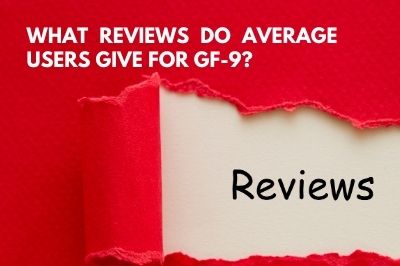 GF-9 is a relatively new supplement, so there’s not a lot of good data to go on regarding its effectiveness. Furthermore, the supplement’s reviews are mixed, questionably sourced, and highly anecdotal. We can however, take a look at what the reviews of the product say as offered by real users. Some who have tried the product, like Youtuber Daniel Hammer, reported losing 3-4% body fat while retaining muscle mass as well as feeling “diminished” following secession of the product.
GF-9 is a relatively new supplement, so there’s not a lot of good data to go on regarding its effectiveness. Furthermore, the supplement’s reviews are mixed, questionably sourced, and highly anecdotal. We can however, take a look at what the reviews of the product say as offered by real users. Some who have tried the product, like Youtuber Daniel Hammer, reported losing 3-4% body fat while retaining muscle mass as well as feeling “diminished” following secession of the product.
In the comments section, some offer skepticism while others agree with Daniel’s positive assessment of the product:
Under the Youtube account name Valentino Parish, one person wrote:
“My bench went all the way up, as well as my squats. i feel like,…i can do and lift anything inside the gym!”*
*It’s worth noting that, although many Youtube comments are genuine and reflect the thoughts of real users, supplement companies are known to “farm out” the posting of positive comments regarding their products on the web for a fee as part of marketing programs. Unfortunately, discriminating real comments made by real people from fake postings is often difficult.
The Dubious Claims Pushed by Producers of Growth Factor-9
In the same comment thread, another user made a good point worthy of consideration:
“They say there is a ‘682% mean increase in natural growth hormone levels’. OK, first of all HOW MUCH do you normally have when you’re 20, 30, 40 years old?”
Novex Biotech does indeed claim on their website that clinical results from their trials showed nearly 700% increases in HGH levels in subjects tested.
Assuming this claim holds water, it raises some important issues. How much of an increase in growth hormone do patients with deficiencies really require? As the old saying goes, too much of something good is a bad thing. More importantly, what are the side effects associated with excessive HGH levels? In fact, too much HGH in circulation is proven to lead to several negative health outcomes, including:
- Acromegaly (characterized by enlarged hands and feet).
- Insulin insensitivity (potentially causing diabetes).
- Potentially severe cardiovascular effects.
- Dangerously elevated cholesterol levels.
- Fluid retention.
While these adverse health events are rare and there is no proof (so far) of them having resulted from the use or abuse of amino acid supplements such as GF-9, these potentially serious health consequences underscore the need for supervision by a healthcare professional when attempting to optimize hormone profiles.
What the Reddit Community Has to Say About Growth Factor-9
The Reddit supplements community, while not an authoritative source of science-backed claims, is a reliable gauge of users’ experiences because it amalgamates so many reviews and opinions from everyday people. On one popular Reddit posting regard GF-9, the comments are telling:
“The only ingredient in Growth Factor 9 that has any effect on growth hormone is arginine and the benefit of the effect is debated.”
“It’s a blend of a few amino acids, glutamine, and some herbs. You can supplement everything that Growth Factor 9 contains for a fraction of the cost.”
“It is very likely the results of taking it are indistinguishable from taking a placebo.”
The placebo effect is a well-documented phenomenon in which users of drugs or supplements experience perceived benefits from the formulation despite there being no provable benefit through an observational study. In short, those who use supplements like GF-9 may imagine benefits when none actually exists.
Does Growth Factor-9 Have a Role in HGH Therapy?
Among healthcare professionals, hormone replacement therapy (HRT) using recombinant human growth hormone (somatropin) via injections has long been considered the go-to therapeutic intervention to correct diagnosed deficiencies. It’s worth pointing out that amino acid supplementation does confer several notable health benefits, especially for athletes, including:
- Greater muscle growth.
- Reducing exercise fatigue.
- Speeding recovery time as it pertains to delayed-onset muscle soreness (DOMS).
Critically, though, for most people, the amino acids they need can be sourced through diet. Occasionally, supplementation may be called for – however, amino acid supplements that are much less expensive than GF-9 can be easily purchased. The bottom line is that no endocrinologist (hormone doctor) would rely on a supplement like GF-9 to correct HGH deficiencies in patients presenting with the condition. Instead, depending on the severity of the deficiency, he or she would first likely recommend lifestyle modifications and then, if necessary, therapy using recombinant human growth hormone.
Are There Natural Methods for Optimizing HGH Levels?
 Medical providers now know much more about the natural methods for elevating HGH levels than in previous eras. As we mentioned earlier, many diet and lifestyle modifications may, in fact, safely restore HGH to optimal levels. We’ll explore some below.
Medical providers now know much more about the natural methods for elevating HGH levels than in previous eras. As we mentioned earlier, many diet and lifestyle modifications may, in fact, safely restore HGH to optimal levels. We’ll explore some below.
Intermittent Fasting to Boost HGH Levels
Intermittent fasting (IF) is one of the biggest science-backed overall health-boosting practices that an individual can adopt. The simplest and most commonly practiced version of IF is called 16:8. It entails restricting caloric intake to zero for 16 hours each day during the period known as the fasting window, followed by 8 hours of normal eating called the feeding window. For many, IF simply means skipping breakfast (except for black coffee). Considering the beneficial health impacts of IF, it is an exceptionally valuable tool for promoting good overall health.
In addition to a dizzying array of other clinically-proven and extremely impressive benefits, restricting caloric intake to zero for extended periods of time is proven to boost both the amplitude (sinusoidal periodicities) and combined frequency (discrete pulses) of HGH release by the pituitary gland.
Weight Lifting for Greater HGH
While greater HGH levels can help out in the gym, the inverse is true as well: weight lifting boosts HGH levels as well as increasing the levels of IGF-1, a partner hormone to HGH.
More Sleep for Increased HGH
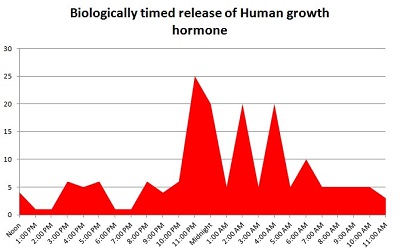
Most Americans do not get nearly enough sleep, arguably the most important aspect of hormonal health since the endocrine system utilizes the downtime during sleep to recover and replenish its supplies of critical hormones like HGH. Far higher quantities of HGH are released during sleep in comparison to the amounts released during waking hours.
To maximize HGH levels, consider getting at least 7 hours of quality sleep each night – admittedly, easier said than done in the fast-paced modern lifestyle that many Americans are accustomed to.
Who Benefits From Taking HGH?
Finally, in the absence of significant increases following the lifestyle changes described above, providers may indicate HRT with HGH as a means to augment HGH levels in individuals who have deficiencies. Adults who have diagnosed HGH deficiencies can benefit from the therapeutic use of somatropin — a synthetic form of HGH that resembles naturally-occurring human growth hormone — to correct the imbalance.
What Is the Most Effective Clinical Treatment for HGH Deficiencies?
The research is clear that intravenous administration of somatropin is the most effective and time-tested method to safely restore HGH levels in most patients for long-term improvements in hormone health.
Take it from an authoritative source: ask any endocrinologist what clinical procedure to correct an HGH deficiency is most effective with the greatest safety profile and you will invariably receive the same answer. HGH therapy is safe, effective, and well-tolerated for most patients who receive it. Best of all, it is increasingly accessible and affordable to patients on tight budgets.
Does Growth Factor-9 Actually Work? The Final Word
Amino acid supplementation –which is essentially what GF-9 is despite its patented status – does offer benefits to athletes that are worth considering. Unfortunately, the evidence that they effectively boost HGH levels (especially for patients with medical conditions like HGH deficiencies) is lacking, to put it mildly.
Until more evidence emerges, the best bet for individuals focused on maximizing their stores of circulating HGH should consider instituting the lifestyle changes described in this article and, if necessary, replacement therapy under the guidance of an experienced endocrinologist.

